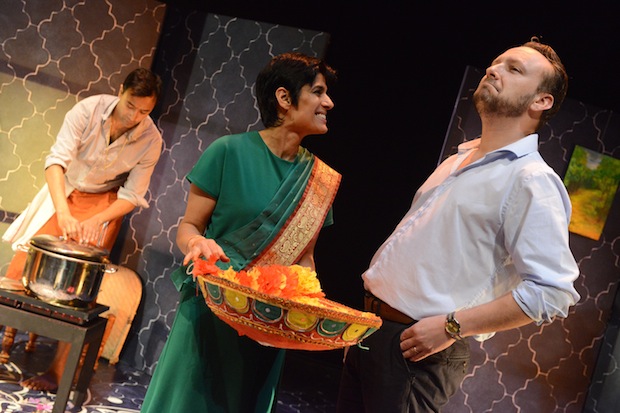Here’s a great idea for a play. Turn the polygamy principle upside-down and you get a female egoist presiding over a harem of warring husbands. Sharmila Chauhan’s drama, The Husbands, introduces us to a pioneering sex maniac, Aya, who founds a commune in India where women take as many spouses as they fancy. Aya herself has three blokes on the go and is about to get married again. Curtain up and we meet her pre-existing husbands, Sem and Omar, who get along together very nicely. Both are childishly besotted with Aya. Which is also nice. Anticipating the arrival of husband number three, the hubbies quietly vacate the bedroom and start preparing a wedding feast. Lovely. For the characters, at least.
But the audience is bound to feel that these guys might be a bit more laddish and competitive. Chauhan can’t find any conflict in her own play. A set-up that should simmer with jealousy and paranoia simply goes pootling along like a mirthless flatshare drama. And the stilted, overformalised dialogue has no ambiguity or hidden motivation.
Enter a new wrinkle: the comedy Englishman. He promptly outrages subcontinental sensitivities in several areas. He refuses to return a Namaste. He forgets to remove his shoes indoors. And he shoves his face into a bubbling pot of dhal and scorches his nose. This could be funny but the archetype he represents — the tactless ex-colonial — hasn’t been seen in India for at least half a century. A likelier target would be the phony western snob desperate to parade his understanding of the local culture. Chauhan opts to humiliate the Englishman further by forcing him to kill a lamb off-stage. Naturally he botches the sacrifice and, after a quick costume change, he trots back in looking a bit flustered and wearing a new shirt decorated with a crimson splothering of conspicuously dry blood. What a shame. A play that wants to ask gripping questions about marital equality spends half an hour examining the capacity of a Hampstead yuppie to decapitate a sheep without staining his clothes.
The play ends with a wordless nuptial pageant that takes longer to get going than most marriages take to break up. Syreeta Kumar plays Aya as a detached and rather majestic intellectual but she can’t bring the opposite poles of the character together. Aya is a wise, courageous political reformer in her late thirties. She’s also a man-guzzling sex champ, who needs two husbands, a fiancé and a secret boyfriend to satisfy her taste for nocturnal gymnastics. It doesn’t help that the sexual electricity between her and her lugubrious, bed-wetting husbands would barely power a torch. The real problem is that the play is about men rather than women and yet the male characters feel entirely unmasculine. It remains a great theme for a drama, though. The next version should be written by a chap.
‘I’d rather Goya robbed me of my sleep than some other arsehole’ is the first line of an experimental fantasy at the Gate. It’s also the title of the play. The Spanish writer Rodrigo Garcia claims in the programme notes to have created a new theatrical language. Cripes. This is like sitting down on a bus next to a man who introduces himself as an astronaut. The main role, performed by an irate Welshman, is a Madrileno who takes his two sons on a midnight trip to the Prado. The sons are played by a pair of live piglets. The Welshman drags them on stage, tosses them about and feeds them scraps. Then he fries an ironic bacon rasher and eats it ‘at them’. Poor little piggies. Lovely things they were, with their dappled splotchy hides and their pink translucent ears. They were chums, too. They hunkered down in a corner, side by side, as the angry Welshmen flung them about and ignored their agonised squeals. What offences, I wondered, had they committed to wind up in this absurdist nightmare? Were they the reincarnated souls of Ionesco and Beckett?
The play, an escapist frivolity, needs a light touch and a sense of playfulness but this production has a graceless, bullying temper. And actor Steffan Rhodri yells every line at the volume of a mile-out swimmer calling for help. I began to ask myself what the audience was doing in this stuffy little space. The easy answer — wasting our time — was emphatically untrue. One of the theatre’s key functions is to contain and placate the neuroses of charismatic drop-outs who disguise their mental-health problems by affiliating themselves with a pressure group called ‘the acting profession’. An audience’s task is to release the energies of these charming maniacs without damaging wider society. If you ever feel bored in a theatre be aware that you are engaged in a noble act of self-sacrifice. Nations that lack vibrant drama are apt to be taken over by tyrants.
Got something to add? Join the discussion and comment below.
Get 10 issues for just $10
Subscribe to The Spectator Australia today for the next 10 magazine issues, plus full online access, for just $10.
You might disagree with half of it, but you’ll enjoy reading all of it. Try your first month for free, then just $2 a week for the remainder of your first year.














Comments
Don't miss out
Join the conversation with other Spectator Australia readers. Subscribe to leave a comment.
SUBSCRIBEAlready a subscriber? Log in